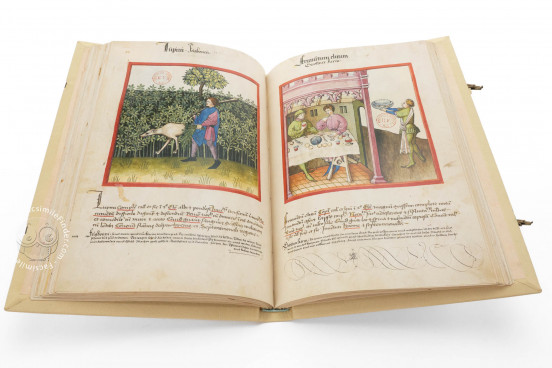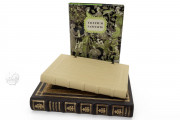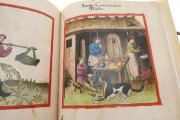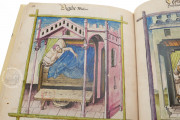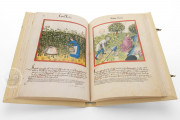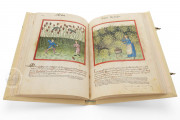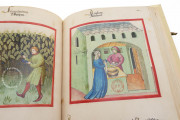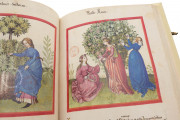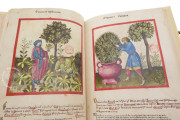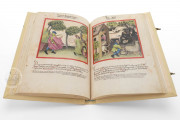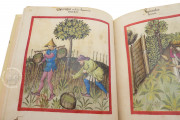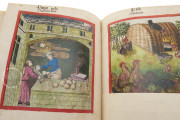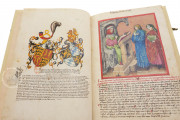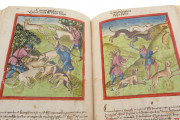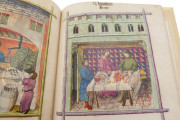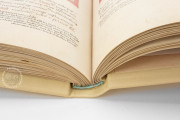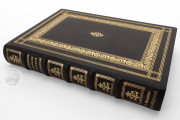The Paris Tacuinum Sanitatis is an illustrated compendium of information about good health. Its core's date and place of origin are debated, as are those of the additions. The principal series of miniatures is the work of two fifteenth-century German artists. Latin texts of the same date accompany them. By 1474, the manuscript was in the library of Eberhard im Bart, Count of Württemberg, and may have been made for him or his parents. The miniatures—numbering 206, each occupying most of a page—depict consumables and human actions and interactions. Each page includes a discussion of the pictured food, thing, or human behavior.
The Latin text, Tacuinum sanitatis ("tables of health"), takes its name from the Arabic word taqwim, meaning "tabular register." It is a thirteenth-century Latin translation of an eleventh-century Arabic treatise by Ibn Buṭlān, which presented the information in a series of tables.
A Long Genesis
After the manuscript's original miniatures were painted and its Latin-language text was written, Eberhard im Bart's motto ("I attempt" in Latin) and the date 1474 were added (fol. Av). The retrospective arms of a marriage alliance between the houses of Württemberg and Wittelsbach (fol. Dv) and German translations of the short Latin texts were added later still, probably around 1600.
Plants, Animals, and Humans
The miniatures of the treatise proper offer a rich visual library of fruits and nuts, grains, vegetables, dairy products, poultry, meat, and fish (fols. 1v-92v), followed by illustrations of human behaviors (fols. 93r-104v). Squarish in format, the images are colored drawings with thin red frames and the unpainted parchment customarily serving as a ground.
The section on foods also treats non-foodstuffs that can be bought in shops—such as musk, camphor, and candles—and the miniatures depict commercial transactions. The consumer's adverse reaction to the odor of musk is vividly captured (fol. 90v). The image for honey shows three hives surrounded by charmingly rendered bees (fol. 91v).
Daily Life Revealed
Most of the miniatures of foodstuffs include human figures, offering glimpses of the dress and decorum of contemporary laypeople. Human behaviors, such as storytelling and talking in one's sleep (fols. 97v-98r), are the subjects of lively illustrations brimming with insights into fifteenth-century life.
One of a Trio
The Paris manuscript is closely related to two other handsome illuminated copies of the text, the Cerruti Tacuinum Sanitatis and the Casanatense Tacuinum Sanitatis. All three were copied from the same fourteenth-century, presumably Italian, model.
From Arabic to Latin to German
According to an added inscription, the author portrait that opens the original manuscript is of "Elbocasim de Baldach" (= Ibn Buṭlān). He is pictured seated on a throne at his writing desk as he instructs two students (fol. 1r). This painting is different from the others in having a painted background.
Eberhard the Bearded
Eberhard (1445-1496), known as "im Bart" (the bearded), was Eberhard V as count of Württemberg and, after 1495, Eberhard I as duke. He married Barbara Gonzaga (1455-1503), daughter of the Marquis of Mantua, in the year his motto was inscribed in the manuscript. That marriage may have led to the presence in his library of a manuscript copied from an Italian model.
Northwest to Paris via Dijon
The binding of blind-tooled white pigskin over boards with brass clasps dates from around 1600, presumably part of the manuscript's enhancement when the German translations of the explanatory texts were added. The Paris Tacuinum Sanitatis is one of eleven manuscripts acquired in Dijon in 1804 by Simon Chardon de la Rochette (1755-1814) for the French Imperial Library, later the Royal Library, and then the Bibliothèque nationale (since 1995, Bibliothèque nationale de France).
We have 1 facsimile edition of the manuscript "Paris Tacuinum Sanitatis": Tacuinum Sanitatis facsimile edition, published by M. Moleiro Editor, 2007
Request Info / Price
